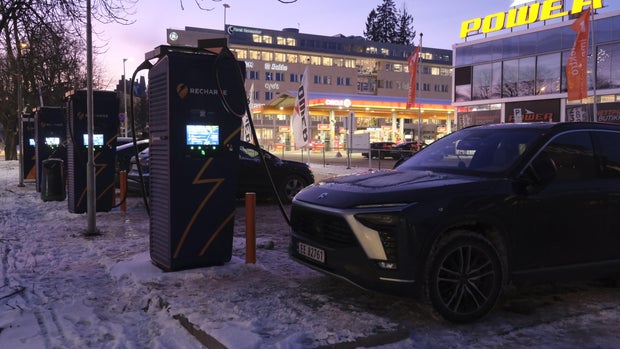Oslo — Almost 96% of new cars registered in Norway in January were electric, an unparalleled proportion in the world and close to the country’s goal of selling only zero-emission vehicles as of this year. A total of 9,343 new cars were sold in January, of which 8,954 were all-electric, the Norwegian Road Federation (OFV) said.
Of the 50 most-sold models, only two were non-electric, the first of which came in 33rd place, the OFV said.
By comparison, the share of electric cars sold in Europe was just 13.6% in the full-year 2024 — a decline for the first time since 2020, according to the car manufacturers’ lobby ACEA. Even that far out-paces EV sales in the U.S., where, according to MotorTrend data from last year, only about 6% of new vehicles sold were electric.
With President Trump now in office after vows to reduce incentives on EV sales brought in under his predecessor, a continued downward trend in U.S. uptake is entirely possible.
“We’ve never seen this before… If the rest of the year continues like this, we will very soon be close to the 2025 goal,” OFV director Oyvind Solberg Thorsen said in a statement. “But if we want to cross the finish line with 100 percent electric cars, it will be necessary to maintain the incentives that make it profitable to choose an electric car over other models.”
Despite being a major oil and gas producer, Norway aims for all new cars sold to be “zero emission” starting in 2025, which is 10 years ahead of the goal set by the European Union, of which Norway is not a member.
In contrast to Brussels’ plans, Oslo has not banned the sale of cars with internal combustion engines, having instead opted for a system of generous tax breaks that have made them competitive against heavily taxed internal combustion cars.
Zhang Yuliang/Xinhua/Getty
They have also benefitted from toll exemptions, free parking in public car parks, and the use of public transport traffic lanes.
How Norway has driven the EV transition
While some tax breaks and incentives have been rolled back over the years, electric cars have become commonplace on Norwegian roads.
“It was a decision primarily motivated by climate and environment considerations,” Frode Hvattum, a 50-year-old father of three who owns two EVs, told AFP.
“Another reason was of course the benefits that come with them,” he said, describing himself as a “climate enthusiast.”
In his upscale neighborhood of Baerum in suburban Oslo, the streets are full of Teslas, Audis and Volkswagens. Competitively priced Chinese brands are increasingly appearing too.
Many homes have a garage with an EV charger, in addition to Norway’s vast national network of superfast charging stations that keep the nation rolling.
That was a precondition for Hvattum, who, like many Norwegians, travels frequently by car to his chalet in the mountains several hours from Oslo.
“It’s less complicated now that the network is so well-developed. You don’t have to plan your trip as much as before,” he said, adding that he uses the 15-20 minute charging breaks needed to make it up to the mountains to shop for food.
Even if EV sales fail to meet the 100% mark this year, experts say that Norway can be seen as having met its goal.
“We should finish the year at between 95 and 100%, and probably even in the high end of this range,” Christina Bu, head of the Norwegian Electric Vehicle Association, told AFP.
A new tax increase on internal combustion cars and rechargeable hybrids — which are cleaner but still run partially on gas or diesel — on April 1 should help.
In January, diesel cars — still common in much of Europe — accounted for just 1.5% of new cars registered in Norway, and gasoline cars just 0.4%, according to the OFV.
“Political leaders can’t rest on their laurels,” Bu warned. “They have to maintain the advantages, such as the toll discounts, so the transition to EVs spreads on the second-hand market.”

